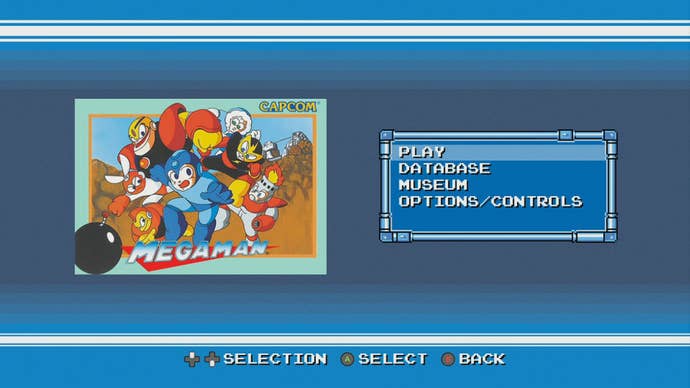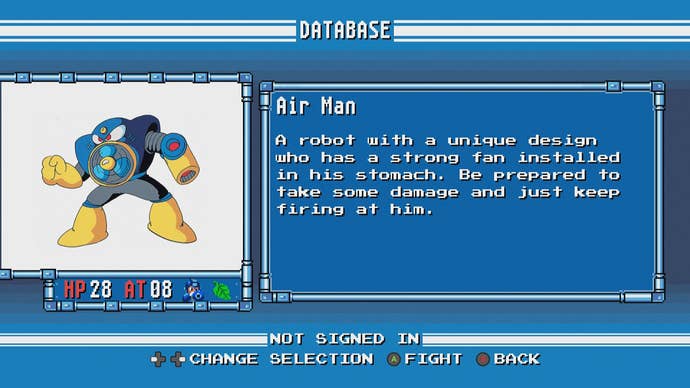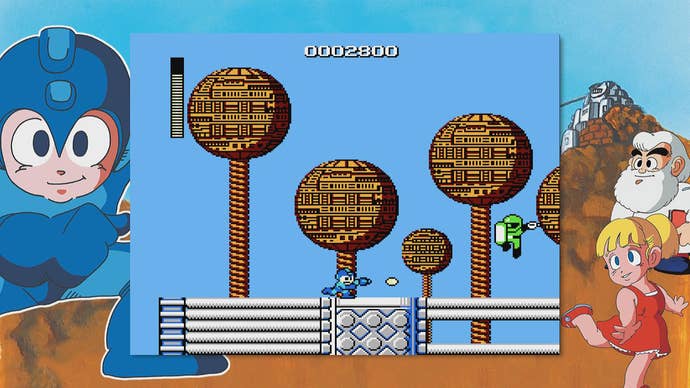The Most In-Depth Mega Man Legacy Collection Interview You'll Read Today
We discuss the philosophy and tech behind the anthology with Capcom and Digital Eclipse.
This article first appeared on USgamer, a partner publication of VG247. Some content, such as this article, has been migrated to VG247 for posterity after USgamer's closure - but it has not been edited or further vetted by the VG247 team.
By now, you should know the deal with the Mega Man Legacy Collection, which arrives next week on Xbox One and PlayStation 4. We spoke about it with Capcom reps on Retronauts, then went hands-on to check out its impressive fidelity to the NES games at E3.
In short, it's a collection of all six NES Mega Man NES games designed to be as faithful to the original software as possible. Developer Digital Eclipse has added some extras, including a database and a challenge mode, as well as a few different display options, but otherwise the goal has been to present the original games as accurately as possible. I recently had the opportunity to meet with Capcom's Rey Jimenez and Digital Eclipse's Frank Cifaldi to learn more about the philosophy behind the collection, talk about the nuts-and-bolts of its creation, and ponder the things that collection doesn't compile.
USgamer: How has reaction been to the Legacy Collection now that people have seen and played it?
Rey Jimenez, Capcom: Everyone that we've talked to really understands the goal that Capcom and Digital Eclipse are after — preservation and the authentic reproduction of the NES games, and understands that why it's only Mega Man 1 through 6. Once we really explained that this is really focusing on the true 8-bit games themselves. Very positive. We didn't get any of the Mega Man cynicism that we were kind of afraid of. It really wasn't there.
Frank Cifaldi, Digital Eclipse: I feel like when there is cynicism, it's for the first couple of minutes and then they actually talk to Rey or me and understand the passion that's actually going into this and it seems to be very positive.

USG: I feel like the cynicism happened at the initial announcement. It seemed like there was more negativity than positivity, maybe it was just where I was looking online….
Frank: Is there any announcement that isn't like that in games?
Rey: I was looking at NeoGAF, which is as cynical as it can get sometimes with these games, and aside from, "Why is this only 1 through 6?" there wasn't too much. Most was very positive.
USG: Personally, seeing just 1 through 6 made sense to me, because it is kind of a set. But also, I've kind of over the years come to appreciate more limited selections and compilations as opposed to an all-encompassing approach. I always hold up the Sega 3D Ages that M2 developed for PlayStation 2 as the gold standard.
Frank: That's what I hear.

USG: Those are each like, two or three games. But they're really comprehensive about those two or three games.
Frank: We at Digital eclipse agree with you. It's kind of one of the things when we started talking about this early on — we identified as what we see as a problem, which is that doing that sort of 30 cowboy movies in one DVD pack you buy at Big Lots sort of approach to games is just devaluing them. I don't think that's right. I think games like the original Mega Man classics are worth a sort of premium presentation — and I say premium even though it's $15 — but I agree with you.
Rey: It's the effort.
Frank: Even stuff we did as Digital Eclipse did in the past, like the Sega Genesis Collection [for PlayStation 3], we just don't feel that approach of throwing everything in a bucket in a value pack is the right way to go, because I don't think that shows rights holders like Capcom that there's actual value in these old games and that we should really take our time and do them right.
Rey: Talking about titles we've actually worked on before, I had worked on the Mega Man Anniversary Collection on the PS2, Xbox and GameCube. While it wasn't just a cash-in, we had all eight games there and some other extra content, and the idea was to give more content. Not that there was no focus on the quality and how accurate they were, but you kind of dilute that particular focus by adding everything else in there. Even though there are technical limitations, by focusing on 1 through 6 we were able to make those much more focused and present authentic game play experiences like they were supposed to be.

USG: It also makes sense from a tech perspective to just go with the NES games because they're the same hardware being reproduced. I know it's not emulation, technically, but it's working to the same spec. Did you consider throwing in [Japan-only Famicom game] RockBoard as a sort of bonus, given that it's the odd one out on the same technology or platform?
Rey: The answer isn't no. We definitely had thought about it, but there wasn't really a way for that to fit in for us, especially since it was in Japanese, right? So…
Frank: We even looked at translating it, if I could speak to that for a second.
Rey: As close to the technological images, you could theoretically do it, but you're starting to go away from everything we're trying to do, which is to keep everything authentic. We couldn't release an all-Japanese board game here in the U.S., so…
USG: Is that just a case where you, personally, wouldn't feel good about it, or the platform rights holders would be, "No go"?
Rey: There is a requirement that all essential game information has to be localized to the support language and a game like a board game has a lot of essential text in it.
Frank: You can't play that if you don't understand Japanese.
USG: So even just throwing it in as a curio was off the table because of the logistics from on high?
Frank: We're aware of all the curios, right?
Rey: Nothing is really impossible if you really want to do it, and you have enough time and resources to do it, but it would just lose the focus of what we're doing.
